

Trump and Transforming Capitalism: Making Our Movement See Itself.
Global. National Association for Business Economics (NABE) Financial crisis of 2007–2010 at Duck Duck Go. The Myth of the Strong Center. At the height of the foreclosure crisis the problems experienced by some so-called “sprawl” markets, like Phoenix and San-Bernardino-Riverside, led some observers to see the largest price declines as largely confined to outer ring suburbs.
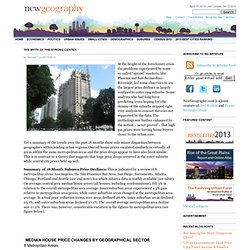
Some analysts who had long been predicting (even hoping for) the demise of the suburbs skipped right over analysis to concoct theories not supported by the data. The mythology was further enhanced by the notion – never proved – that high gas prices were forcing home buyers closer to the urban core. Yet a summary of the trends over the past 18 months show only minor disparities between geographies within leading urban regions. Overall house prices escalated similarly in virtually all areas within the same metropolitan areas and the price drops appear to have also been similar. This is in contrast to a theory that suggests that huge price drops occurred in the outer suburbs while central city prices held up well. Core Condominium Market Crisis. Center for Economic Research and Forecasting. This article was written by Bill Watkins and previously published on New Geography on November 12, 2013.
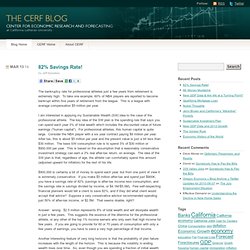
Jerry Brown is supposed to be a different kind of politician: well informed, smart, slick, and skilled. While he has had some missteps, he’s always bounced back. His savvy smarts have allowed him to have a fantastically successful career while generally avoiding the egregious dishonesty that characterizes so many political practitioners. Economics. For a topical guide to this subject, see Outline of economics.
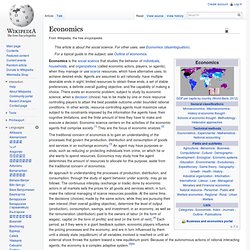
Economics is the social science that studies the behavior of individuals, households, and organizations (called economic actors, players, or agents), when they manage or use scarce resources, which have alternative uses, to achieve desired ends. Agents are assumed to act rationally, have multiple desirable ends in sight, limited resources to obtain these ends, a set of stable preferences, a definite overall guiding objective, and the capability of making a choice. There exists an economic problem, subject to study by economic science, when a decision (choice) has to be made by one or more resource-controlling players to attain the best possible outcome under bounded rational conditions. The Conference Board - Trusted Insights for Business Worldwide.
A parable about how one nation came to financial ruin. - By Char. In the early 1700s, Europeans discovered in the Pacific Ocean a large, unpopulated island with a temperate climate, rich in all nature's bounty except coal, oil, and natural gas.
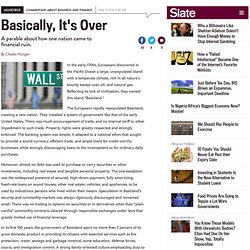
Economic News, Trends, Research and Data - The Conference Board. Macroeconomics for the 21st century: Part 1, Theory. Roger E.
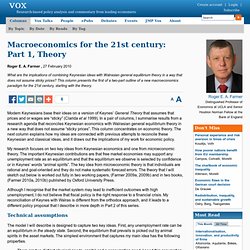
A. Farmer , 27 February 2010 Modern Keynesians base their ideas on a version of Keynes’ General Theory that assumes that prices and or wages are “sticky” (Clarida et al 1999). In a pair of columns, I summarise results from a research agenda that reconciles Keynesian economics with Walrasian general equilibrium theory in a new way that does not assume “sticky prices”. This column concentrates on economic theory. My research focuses on two key ideas from Keynesian economics and one from microeconomic theory. Although I recognise that the market system may lead to inefficient outcomes with high unemployment, I do not believe that fiscal policy is the right response to a financial crisis. The model I will describe is designed to capture two key ideas. There are two distinct physical goods, capital and a consumption good. IMF Musings: Can Higher Inflation Be a Good Thing? - SPIEGEL ONL.
In 1972, Helmut Schmidt, then Germany's minister for both economics and finance, declared at an election campaign appearance that "5 percent inflation is easier to bear than 5 percent unemployment.
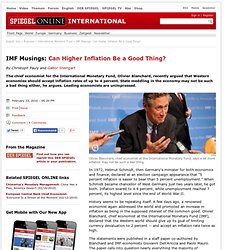
" When Schmidt became chancellor of West Germany just two years later, he got both. Inflation soared to 4.9 percent, while unemployment reached 7 percent, its highest level since the end of World War II. History seems to be repeating itself. A few days ago, a renowned economist again addressed the world and promoted an increase in inflation as being in the supposed interest of the common good. Olivier Blanchard, chief economist at the International Monetary Fund (IMF), declared that the Western world should give up its goal of limiting currency devaluation to 2 percent -- and accept an inflation rate twice as high. Economic, demographic, and political commenta. Economic history - Bubblegeneration - Swicki swicki - powered by.
Midwest Economy. US & Canada - Self-doubt tarnishes Brand America. Economics blog - Find bloggers. Alphaville. P2P Foundation " Blog Archive " An introduction to the. LSE - London School of Economics and Political Science. Naomi Klein and Joseph Stiglitz on Economic Power.
Bio Hernando de Soto Hernando de Soto is President of the Institute for Liberty and Democracy, headquartered in Lima, Peru and considered by The Economist to be one of the two most important think tanks in the world.

Time and Forbes have chosen him as one of the leading innovators in the world, and more than 20,000 readers of Prospect and Foreign Policy ranked him as one of the world's top 13 public intellectuals. He has served as President of the Executive Committee of the Copper Exporting Countries Organization, as CEO of Universal Engineering Corporation (one of Europe's largest consulting engineering firms), as a principal of the Swiss Bank Corporation Consultant Group, and as a governor of Peru's Central Reserve Bank.
He is the author of several books and papers on economic policy, including the seminal work The Mystery of Capital. David Harvey David Harvey is the Distinguished Professor of Anthropology at the Graduate Center of the City University of New York (CUNY). Business, Economics, Culture, and More — The American, A Magazin. Welcome. Twelve Reasons For A Job Loss Recovery. I have been talking about the Job Loss Recovery for quite some time.
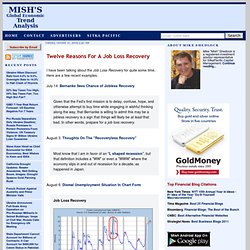
Here are a few recent examples. July 14: Bernanke Sees Chance of Jobless Recovery Given that the Fed's first mission is to delay, confuse, hope, and otherwise attempt to buy time while engaging in wishful thinking along the way, that Bernanke is willing to admit this may be a jobless recovery is a sign that things will likely be at least that bad. In other words, prepare for a job loss recovery. Alltop - Top The Economist News.